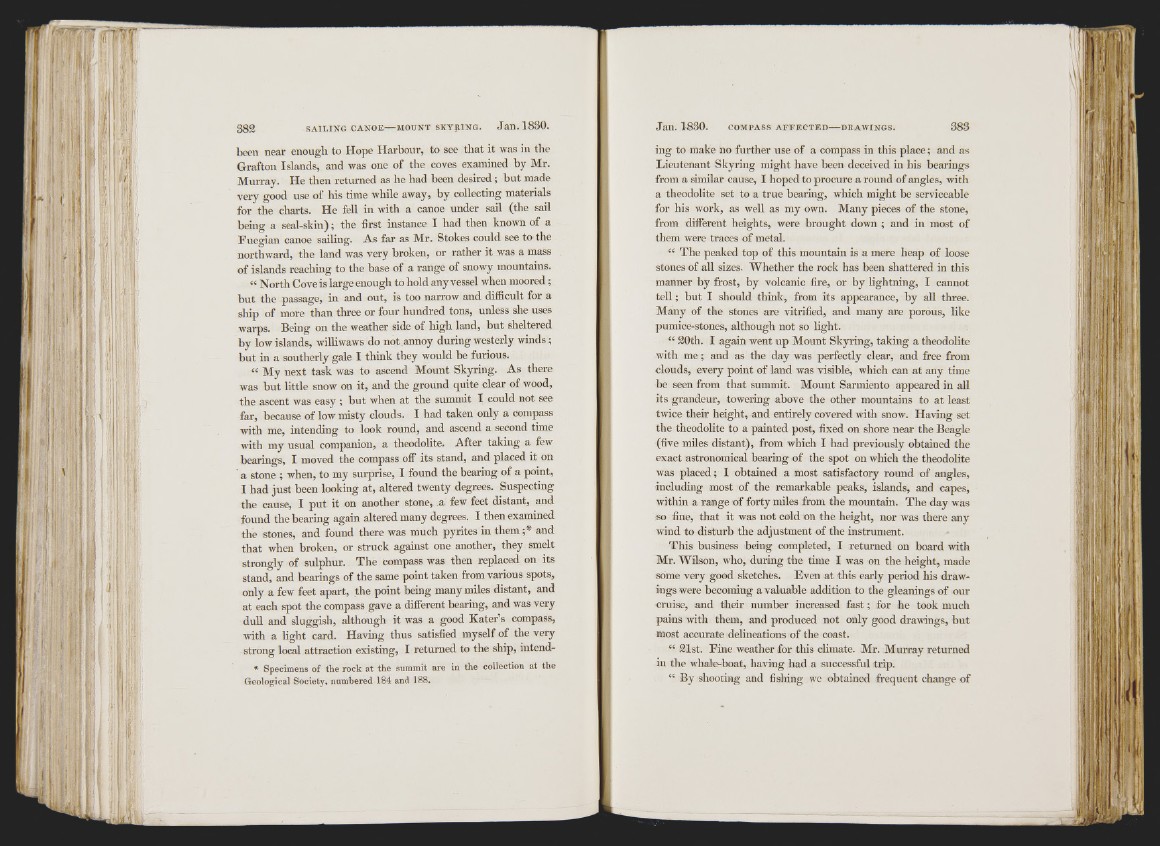
!' i
• t
1 '
’ f
t" ! -
1
H (1 ,'- 1I{ ; Aht; ii , li"
/ '
f .'
u
l i ; i ; -
«' i f t P: n . ■ • i
been near enough to Hope Harbour, to see that it was in the
Grafton Islands, and was one of the coves examined by Mr.
Murray. He then returned as he had been desired; hut made
very good use of his time while away, by collecting materials
for the charts. He fell in with a canoe under sail (the sail
being a seal-skin); the first instance I had then known of a
Fuegian canoe sailing. As far as Mr. Stokes could see to the
northward, the land was very broken, or rather it was a mass
of islands reaching to the base of a range of snowy mountains.
“ North Cove is large enough to hold any vessel when moored;
but the passage, in and out, is too narrow and difficult for a
ship of more than three or four hundred tons, unless she uses
warps. Being on the weather side of high land, but sheltered
by low islands, williwaws do not annoy during westerly winds;
but in a southerly gale I think they would he furious.
“ My next task was to ascend Mount Skyring. As there
was but little snow on it, and the ground quite clear of wood,
the ascent was easy ; but when at the summit I could not see
far, because of low misty clouds. I had taken only a compass
with me, intending to look round, and ascend a second time
with my usual companion, a theodolite. After taking a few
bearings, I moved the compass off its stand, and placed it on
a stone ; when, to my surprise, I found the bearing of a point,
I had just been looking at, altered twenty degrees. Suspecting
the cause, I put it on another stone, a few feet distant, and
found the hearing again altered many degrees. I then examined
the stones, and found there was much pyrites in them ;* and
that when broken, or struck against one another, they smelt
strongly of sulphur. The compass was then replaced on its
stand, and bearings of the same point taken from various spots,
only a few feet apart, the point being many miles distant, and
at each spot the compass gave a different bearing, and was very
dull and sluggish, although it was a good Kater’s compass,
with a light card. Having thus satisfied myself of the very
strong local attraction existing, I returned to the ship, intend-
* Specimens of the rock at the summit are in the collection at the
Geological Society, numbered 184 and 188.
ing to make no further use of a compass in this place; and as
Lieutenant Skyring might have been deceived in his bearings
from a similar cause, I hoped to procure a round of angles, with
a theodolite set to a true bearing, which might be serviceable
for his work, as well as my own. Many pieces of the stone,
from different heights, were brought down ; and in most of
them were traces of metal.
“ The peaked top of this mountain is a mere heap of loose
stones of all sizes. Whether the rock has been shattered in this
manner by frost, by volcanic fire, or by lightning, I cannot
te ll; but I should think, from its appearance, by all three.
Many of the stones are vitrified, and. many are porous, like
pumice-stones, although not so light.
“ SOth. I again went up Mount Skyring, taking a theodolite
with me; and as the day was perfectly clear, and free from
clouds, every point of land was visible, which can at any time
be seen from that summit. Mount Sarmiento appeared in all
its grandeur, towering above the other mountains to at least
twice their height, and entirely covered with snow. Having set
the theodolite to a painted post, fixed on shore near the Beagle
(five miles distant), from which I had previously obtained the
exact astronomical bearing of the spot on which the theodolite
was placed; I obtained a most satisfactory round of angles,
including most of the remarkable peaks, islands, and capes,
within a range of forty miles from the mountain. The day was
so fine, that it was not cold on the height, nor was there any
wind to disturb the adjustment of the instrument.
This business being completed, I returned on board with
Mr. Wilson, who, during the time I was on the height, made
some very good sketches. Even at this early period his drawings
were becoming a valuable addition to the gleanings of our
cruise, and their number increased fast; for he took much
pains with them, and produced not only good drawings, but
most accurate delineations of the coast.
“ 21st. Fine weather for this climate. Mr. Murray returned
in the whale-boat, having had a successful trip.
“ By sliooting and fishing we obfained frequent change of
J v.f!